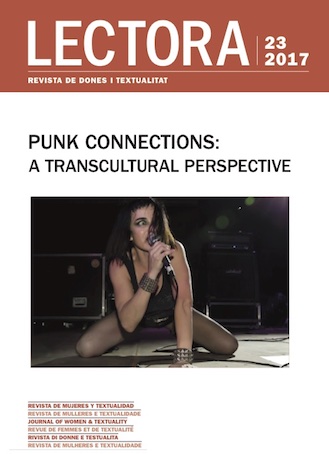Memorias Selectivas: Two Films by Spanish Punk Women
DOI:
https://doi.org/10.1344/Lectora2017.23.3Keywords:
gender, punk, Spain, la Movida, la transiciónAbstract
The role of women in punk has been dominated by a particular doxa and by repeated acts of omission and misrepresentation. This has certainly been the case in much of the historiography and journalism about Spanish punk/la Movida, where a more nuanced and rigorous narrative about punk/la Movida and its women still needs to be created. This article addresses some discourses that dominate the commemorations of the movement and how they interact in the work of two women who were not simply witnesses but took part in the musical scene: Chus Gutiérrez and Beatriz Alonso Aranzábal.
References
Allinson, Mark (2000), "The Construction of Youth in Spain in the 1980s and 1990s", Contemporary Spanish Cultural Studies, Barry Jordan and Rikki Morgan-Tamosunas (eds.), London, Arnold: 265-273.
Cervera, Rafa (2002), Alaska y otras historias de la Movida, Barcelona, Plaza y Janés.
Eede, Christian (2016), "Viv Albertine Defaces Punk Exhibition", The Quietus, 18/07/2016.
Enders, Victoria L. (1992), "Nationalism and Feminism: The Sección Femenina of the Falange", History of European Ideas, 15, 4-6: 673-680.
Foucé, Héctor (2006), El futuro ya está aquí. Música pop y cambio cultural, Madrid, Velecio editores.
Freud, Sigmund (1956), Civilization and its Discontents, London, The Hogarth Press. [1936]
Gallero, José Luis (1991), Sólo se vive una vez. Esplendor y ruina de la Movida madrileña, Madrid, Ardora Ediciones.
Godes, Patricia (2013), Grandes éxitos de Alaska y los Pegamoides: El año que España se volvió loca, Madrid, Lengua de trapo.
Graham, Helen and Jo Labanyi (1995), Spanish Cultural Studies. An Introduction, Oxford, Oxford University Press.
Gutiérrez, Chus (2011), "Xoxonees", Chus Gutiérrez.
Jenkins, Lin (2016), "Anarchy on the Thames as Punks Fire Back", The Observer, 27/11/2016: 14.
Jeremy, Pako (2013), "Ana Curra, Santa autosuficiencia", 40 Putes, 06/06/2013.
Jonze, Tim (2016), "Malcolm McLaren’s Son to Burn £5m of Punk Memorabilia", The Guardian, 16/03/2016.
Kinder, Marsha (1987), "Pleasure and the New Spanish Mentality: A Conversation with Pedro Almodóvar", Film Quarterly, 41,1: 33-44.
Lenore, Víctor (2012), "Música en la CT: los sonidos del silencio", CT o la Cultura de la Transición. Crítica a 35 años de cultura española, VV.AA., Guillem Martínez (coord.), Madrid, Debolsillo: 115-23.
Manrique, Diego A. (2005), "Chus Gutiérrez evoca la Movida y el 23F", El País, 24/06/2005.
Marí, Jorge (2013), "La Movida as a Debate", Towards a Cultural Archive of La Movida, William J. Nichols and H. Rosi Song (eds.), Madison, Fairleigh Dickinson University Press: 12-28.
Márquez, Fernando "El Zurdo" (2014), Música moderna, Madrid, La fonoteca. [1981]
Mira, Alberto (2009), "The Dark Heart of the Movida: Vampire Fantasies in Iván Zulueta’s Arrebato", Arizona Journal of Hispanic Cultural Studies, 3: 155-169.
O’Brien, Lucy (2012), She Bop. The Definitive History of Women in Popular Music, London, Jawbone Press. [1992]
Ordovás, Jesús (1987), "La movida madrileña agoniza entre algodones", Cambio 16, 23/03/1987: 114-18.
Pook, Lizzie (2016), "Women of Punk. Queens of the Punk Age", Stylist, 313: 59- 61.
Preston, Paul (1986), The Triumph of Democracy in Spain, London, Routledge.
Raha, Maria (2005), Cinderella's Big Score: Women of the Punk and Indie Underground, Emeryville, Seal Press.
Reddington, Helen (2007), The Lost Women of Rock Music. Female Musicians of the Punk Era, Lancaster, Equinox.
Richardson Andrews, Charlotte (2014), "Punk Has a Problem with Women. Why?", The Guardian, 3/07/2014.
Tango, Cristina (2006), La transición y su doble: el rock y Radio Futura, Madrid, Biblioteca Nueva.
Smith, Paul Julian (1994), Desire Unlimited. The Cinema of Pedro Almodóvar, London, Verso.
Tizón, Eloy (2016), "De un tiempo libre", El Cultural, 25/03/2016.
Vilarós, Teresa (1998), El mono del desencanto: una crítica cultural de la transición española (1973-1993), Madrid, Siglo veintiuno.
Warner, Marina (1985), Monuments and Maidens. The Allegory of the Female Form, London, Weidenfeld and Nicolson.
Wheeler, Duncan (2016), "All Her Friends Call Her Alaska: The Cultural Politics of Locating Olvido Gara In and Beyond Madrid’s Movida", Journal of Spanish Cultural Studies, 17(4): 361-383.
FILMOGRAPHY
Alonso Aranzábal, Beatriz (2015), De un tiempo libre a esta parte. Una adolescencia musical, BAA [documentary].
Gutiérrez, Chus (2005), El Calentito, Telespan 2000 and Estudios Picasso [film].
Downloads
Published
How to Cite
Issue
Section
License
The Author retains ownership of the copyright in this article and grants Lectora: revista de dones i textualitat the rights to print publication of the Article. The work will be available under a Creative Commons Attribution-Noncommercial-No Derivative Works license, by which the article must be credited to the Author and the Journal be credited as first place of publication.
The Author is free to enter in seperate, additional contractual agreements for the non-exclusive distribution of the work as published in this journal (such as institutional repositories or a book), as long as the original publication in Lectora is credited.
The Author is encouraged to post the work online (eg in institutional or thematic repositories, or in their website), as it can lead to productive exchanges as well as to a greater citation of the published work (see The Effect of Open Access).




